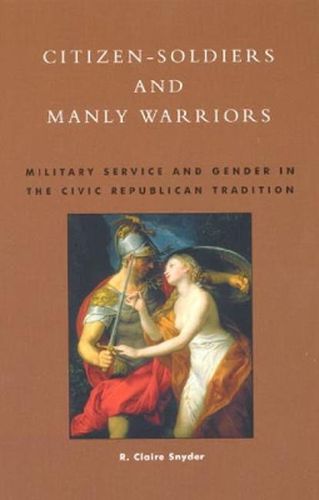Readings Newsletter
Become a Readings Member to make your shopping experience even easier.
Sign in or sign up for free!
You’re not far away from qualifying for FREE standard shipping within Australia
You’ve qualified for FREE standard shipping within Australia
The cart is loading…






What happens in a tradition that links citizenship with soldiering when women become citizens? This is an analysis of the theory and practice of the citizen-soldier in historical context. Using a postmodern feminist lens, R. Claire Snyder reveals that within the citizen-soldier tradition, citizenship and masculinity are simultaneously constituted through engagement in civic and martial practices. Seeking to sever the connection between masculinity and citizenship, Snyder calls for women to make gender trouble by engaging in the practices traditionally associated with masculine republican citizenship. However, in order to reconstitute the citizen-soldier tradition, the only tradition we have that holds the military up to democratic standards, we must not only trouble but also reconfigure our understandings of gender and citizenship. Thus gender parity in the military is not enough. We must also change the type of masculinity produced by the military, reintroduce the military to its civic purposes, expand the citizenship of civic practices to include other non-martial forms of service, and give citizens a greater role in political decision making.
$9.00 standard shipping within Australia
FREE standard shipping within Australia for orders over $100.00
Express & International shipping calculated at checkout
What happens in a tradition that links citizenship with soldiering when women become citizens? This is an analysis of the theory and practice of the citizen-soldier in historical context. Using a postmodern feminist lens, R. Claire Snyder reveals that within the citizen-soldier tradition, citizenship and masculinity are simultaneously constituted through engagement in civic and martial practices. Seeking to sever the connection between masculinity and citizenship, Snyder calls for women to make gender trouble by engaging in the practices traditionally associated with masculine republican citizenship. However, in order to reconstitute the citizen-soldier tradition, the only tradition we have that holds the military up to democratic standards, we must not only trouble but also reconfigure our understandings of gender and citizenship. Thus gender parity in the military is not enough. We must also change the type of masculinity produced by the military, reintroduce the military to its civic purposes, expand the citizenship of civic practices to include other non-martial forms of service, and give citizens a greater role in political decision making.